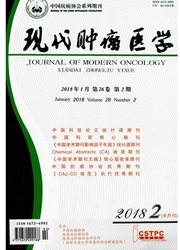

 中文摘要:
中文摘要:
目的:研究核糖体S6蛋白激酶4(RSK4)和p63在食管鳞癌中的表达,探索其与患者临床病理特征的关系,并分析两者在肿瘤组织中表达的相关性。方法:采用免疫组织化学EnV ision法检测RSK4和p63在72例食管鳞癌标本中的表达,并用统计学方法分析两种蛋白表达的相关性及与其中66例住院患者临床病理特征的关系。结果:正常食管鳞状上皮中RSK4与p63主要表达于基底层细胞,而在食管鳞癌中RSK4和p63则表达于大部分肿瘤细胞,其阳性率分别为62.5%和83.8%。RSK4的阳性表达与肿瘤病理分期呈正相关(P〈0.05);RSK4与p63的表达在食管鳞癌中呈正相关(r=0.327,P=0.003),且大多在同一肿瘤细胞中共同表达。结论:RSK4与p63在食管鳞癌中存在异常表达,且RSK4与p63之间可能存在相互调控关系,研究RSK与p63表达及其相互关系将有助于探索食管鳞癌的发病机制,为其临床诊断及治疗提供一定理论依据。
 英文摘要:
英文摘要:
Objective:The study aimed to investigate the expressions of RSK4 and p63 in esophageal squamous cell carcinoma,identify their relationship with clinicopathologic features,and analyze the correlation between their expressions in tumor tissues.Methods:The En Vision immunohistochemistrical method was employed to detect the expressions of RSK4 and p63 in 72 cases of esophageal squamous cell carcinoma,and statistical methods were used to analyze correlation between the expressions of RSK4 and p63,as well as the possible relationship between their expressions and clinicopathologic features of 66 clinical cases.Results: High expressions of RSK4 and p6 3 were found in the nests of esophageal squamous cell carcinoma,with a positive rate of 62.5% and 83.8% respectively.Statistical analysis showed a positive correlation between tumor staging and the expression of RSK4 in carcinoma.As is indicated by the Pearson analysis,there was also a positive correlation between expressions of RSK4 and p63( r =0.327,P = 0.003),most of which were co-expressed in the same cells.Conclusion: Aberrant expressions of RSK4 and p63 were identified in esophageal squamous cell carcinoma.Also,there may exist interaction between the two molecules.This research into the roles of RSK4 and p63 may help explore the tumorigenesis,tumor progression,diagnosis and therapy of esophageal squamous cell carcinoma.
 同期刊论文项目
同期刊论文项目
 同项目期刊论文
同项目期刊论文
 期刊信息
期刊信息
